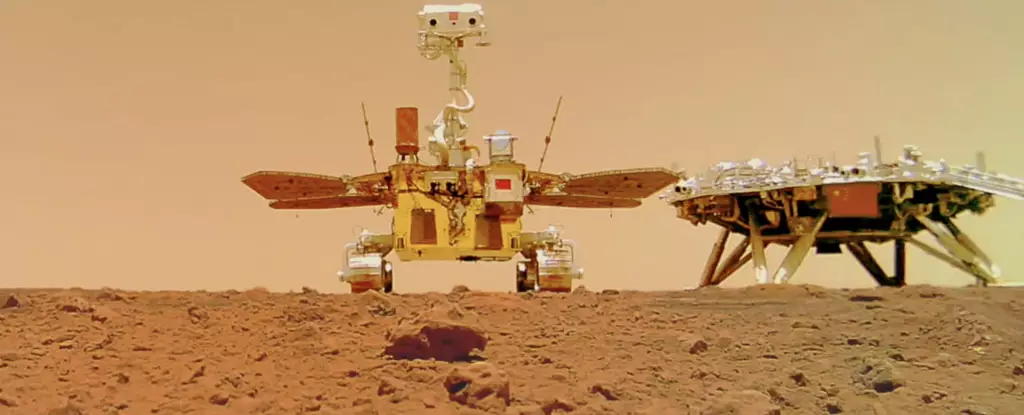The quest to determine whether Mars once hosted vast bodies of water remains a captivating area of research, igniting debates and inspiring missions aimed at unearthing the planet’s past. Recent observations made by China’s Zhurong rover have intensified speculation regarding the existence of an ancient ocean on Mars, revealing what some researchers claim to be features indicative of past marine environments. However, despite these exciting discoveries, skepticism persists within the scientific community, underscoring the complexities involved in interpreting Martian geological history.
Launched as part of a groundbreaking mission, Zhurong landed in the Utopia Planitia region of the northern hemisphere in May 2021. Since its arrival, the rover has systematically studied the terrain, providing insights and data that suggest the presence of ancient water bodies. Notable findings include features described as “pitted cones, polygonal troughs, and etched flows,” which have reverberated throughout the scientific community.
Lead investigator Bo Wu from The Hong Kong Polytechnic University highlighted that these formations may suggest the past existence of a substantial ocean. The study proposes that conditions on Mars were dramatically different from what we observe today. Researchers estimated the inception of the ocean may have occurred approximately 3.7 billion years ago, followed by a subsequent freezing and erosion period that possibly shaped the landscape we now see.
The implications are monumental. If verified, this theory could suggest that Mars was once capable of hosting microbial life, reminiscent of Earth’s ancient oceans which served as fertile grounds for the emergence of life.
Despite the tantalizing findings, not all scientists are convinced. Benjamin Cardenas, a researcher at Pennsylvania State University, voiced skepticism regarding the interpretation of the geological features surrounding the Zhurong landing site. He drew attention to the fact that Martian winds have been known to erode and redistribute sediment for billions of years. Cardenas maintained that only a thorough analysis of samples collected from Mars would shed definitive light on the matter.
While wind-driven erosion is indeed a powerful force, one cannot overlook the role of impacts from meteors, which can expose buried subsurface materials. Both acknowledgments present a complex picture of Martian geological processes, illustrating the juxtaposition between ideas of a tranquil, unchanging landscape and a planet experiencing dynamic geological activity.
The ongoing exploration of Mars and the potential for discerning its ancient conditions poses a broader question: Are we alone in the universe? Understanding Mars and the possibility of past life there could hold clues to how life originated on Earth and potentially exists elsewhere in the Solar System.
Current theories suggest that life on our home planet may have emerged in oceanic environments where chemical processes fueled by volcanic activity provided the necessary conditions for life. If Mars harbored similar environments, even if briefly, it could reshape our understanding of planetary habitability and the conditions necessary for life.
To address these questions, missions aimed at returning samples from Mars to Earth are critical. Such endeavors would provide invaluable data, enabling scientists to perform in-depth analyses and make more definitive conclusions. Until then, the debate surrounding the evidence of an ancient Martian ocean is likely to remain active, inspiring further research and observations.
The question of whether Mars once held an ocean continues to unfold like a richly woven tapestry. As researchers dive deeper into the mysteries of the Martian landscape, new findings often spark additional inquiries, each one bringing us closer to understanding our neighbor’s intriguing past. While the evidence presented by the Zhurong rover is compelling, the skeptics’ caution reminds us that the pursuit of knowledge is often filled with uncertainties and ongoing dialogue. The exploration of Mars is not merely the study of a planet; it is a quest to understand the very nature of life itself, both on Earth and beyond.


Leave a Reply